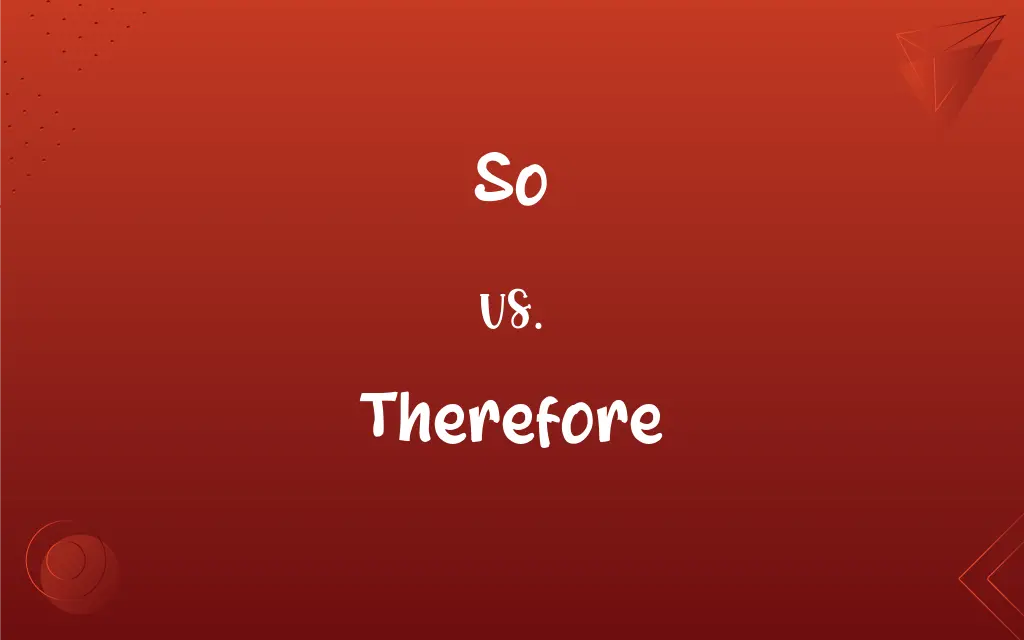So vs. Therefore: What's the Difference?
Edited by Harlon Moss || By Janet White || Published on December 11, 2023
"So" is a conjunction used to express a consequence or result, while "therefore" is a formal adverb indicating a conclusion or logical result.

Key Differences
"So" is commonly used in everyday language to indicate a cause-and-effect relationship in a more casual or conversational manner. "Therefore", however, is used to denote a conclusion that is the result of a logical argument, often in formal or academic writing.
The use of "so" often implies a direct, immediate consequence and is used in informal contexts. "Therefore", on the other hand, suggests a more reasoned or deduced outcome and is typical in formal discourse.
"So" can be used in various sentence structures, including the beginning of sentences, and is more versatile. "Therefore", is usually found in the middle or at the beginning of a sentence, often followed by a comma.
In speech, "so" is frequently used and can be accompanied by different intonations to convey various nuances. "Therefore" is less common in everyday speech and maintains a consistent, formal tone.
"So" is a part of many idiomatic expressions and has multiple uses besides showing cause and effect. "Therefore" is primarily used to show a logical relationship and has limited alternative uses.
ADVERTISEMENT
Comparison Chart
Usage
Casual, conversational
Formal, academic
Implication
Direct consequence
Logical conclusion
Sentence Position
Flexible, can start sentences
Usually mid or start of sentence, often followed by a comma
Tone
Varied, depending on context
Consistently formal
Alternative Uses
Many, including idiomatic expressions
Limited, mostly logical reasoning
ADVERTISEMENT
So and Therefore Definitions
So
Used to introduce a result or consequence.
It was raining, so we stayed indoors.
Therefore
Used to introduce a reasoned conclusion.
All humans are mortal; Socrates is human; therefore, Socrates is mortal.
So
Indicates a reason or explanation.
He was the only applicant, so he got the job.
Therefore
Indicates a logical result or conclusion.
The road was icy; therefore, driving was dangerous.
So
Used to emphasize a statement.
I do care, so much indeed.
Therefore
Presents the outcome of a previous statement.
He did not study; therefore, he failed the test.
So
Used to connect and continue a narrative.
So, what happened next?
Therefore
Used in formal arguments or discussions.
The experiment was flawed; therefore, the results are invalid.
So
Introduces a condition or stipulation.
Study well, so you can pass the exam.
Therefore
Introduces a necessary consequence.
The company is expanding; therefore, we need more staff.
So
To the amount or degree expressed or understood; to such an extent
She was so happy that she cried.
Therefore
For that reason or cause; consequently or hence.
So
To a great extent; to such an evident degree
But the idea is so obvious.
Therefore
(conjunctive) Consequently, by or in consequence of that or this cause; referring to something previously stated.
Traditional values will always have a place. Therefore, they will never lose relevance.
FAQs
What is the primary use of "so"?
To introduce a consequence or result in a sentence.
Is "therefore" common in everyday speech?
It's less common in casual speech and more used in formal contexts.
Are "so" and "therefore" interchangeable?
Not always, as they differ in formality and context.
Can "so" start a sentence?
Yes, "so" can start a sentence, especially in conversational English.
How is "therefore" used differently from "so"?
"Therefore" is used to introduce a logical conclusion, often in formal writing.
Is "therefore" used in academic writing?
Yes, it's frequently used in academic and formal writing.
What kind of tone does "therefore" convey?
A formal and logical tone.
Can "so" be used for emphasis?
Yes, "so" can be used to emphasize a statement.
Can "therefore" be used at the start of a sentence?
Yes, but it's often followed by a comma.
Is "so" informal?
It's more informal and versatile than "therefore."
Can "so" be used in logical arguments?
Yes, but "therefore" is preferred for strict logical reasoning.
Does "therefore" have alternative uses?
It's primarily used for showing logical relationships and has limited other uses.
Do "so" and "therefore" have the same grammatical role?
They both serve as conjunctions but differ in formality and usage.
Can "therefore" be replaced with "thus" in formal writing?
Yes, "thus" is a formal synonym of "therefore."
Does "so" have multiple meanings?
Yes, "so" has various uses, including indicating a consequence, reason, or condition.
How does intonation affect the meaning of "so"?
Different intonations can convey various nuances or attitudes.
Is "therefore" suitable for casual conversations?
It can be used, but it may sound overly formal.
Is "so" appropriate for formal writing?
It can be used, but "therefore" might be preferred for formal logic.
Is "so" used in idiomatic expressions?
Yes, it appears in many idiomatic expressions.
Can "therefore" indicate cause and effect?
Yes, but in a more formal and logical manner.
About Author
Written by
Janet WhiteJanet White has been an esteemed writer and blogger for Difference Wiki. Holding a Master's degree in Science and Medical Journalism from the prestigious Boston University, she has consistently demonstrated her expertise and passion for her field. When she's not immersed in her work, Janet relishes her time exercising, delving into a good book, and cherishing moments with friends and family.
Edited by
Harlon MossHarlon is a seasoned quality moderator and accomplished content writer for Difference Wiki. An alumnus of the prestigious University of California, he earned his degree in Computer Science. Leveraging his academic background, Harlon brings a meticulous and informed perspective to his work, ensuring content accuracy and excellence.






































































